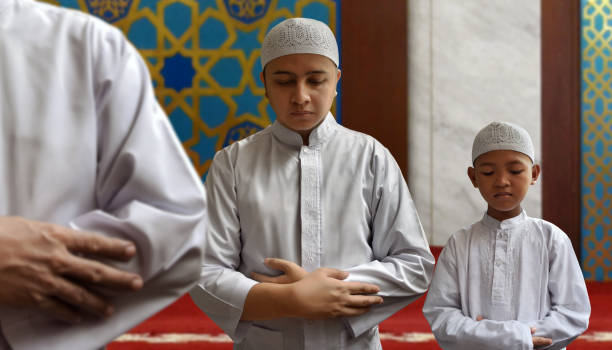Islamic Baby Names In the Islamic tradition, the name of a child is much more than just a label. It is a reflection of the parents’ values, their hopes for the child, and their connection to their faith. In Islam, names are deeply meaningful and often carry great spiritual significance, as the Prophet Muhammad (PBUH) himself emphasized the importance of choosing good names for children.

This article explores the significance of Islamic baby names, offering guidance and examples from the Quran and Ahadees. By the end, you will have a better understanding of how to select a name for your newborn that carries deep meaning, reflects Islamic values, and ensures a connection to the beautiful teachings of the religion.
- The Importance of Choosing a Good Name in Islam
In Islam, naming a child is a very important responsibility. The name is not just for identification, but it shapes the child’s identity and, in a way, their destiny. A good name is seen as a blessing, while a bad name may affect the child negatively.
The Prophet Muhammad (PBUH) highlighted the significance of good names in many of his sayings. One such hadith states:
“On the Day of Judgment, you will be called by your names and the names of your fathers, so choose good names.” (Sunan Abu Dawood)
This hadith underlines the idea that names are not just for this world but will carry over into the Hereafter. The importance of selecting meaningful and virtuous names is emphasized, and the Prophet (PBUH) taught us to consider names that reflect the high moral standards that Islam upholds.

The Quran is the central text in Islam, and it contains many names that hold great significance. These names are often derived from the stories of the Prophets, righteous people, and key moments in Islamic history. The Quran also offers names that symbolize positive attributes such as purity, wisdom, and strength.
For Boys:
Muhammad (محمد) – The name Muhammad is derived from the Prophet Muhammad (PBUH) and means “praiseworthy” or “highly praised.” It is one of the most beloved names in Islam and is also mentioned in the Quran as a source of blessings.
“Muhammad is not the father of any of your men, but he is the Messenger of Allah and the seal of the prophets.” (Quran, 33:40)
Ali (علي) – The name Ali, meaning “elevated” or “exalted,” is of great historical importance in Islam. Ali (RA), the cousin and son-in-law of the Prophet (PBUH), was known for his wisdom, bravery, and devotion to Islam.

Imran (عمران) – Imran was the father of Maryam (RA), the mother of Isa (AS), and his name appears in the Quran in Surah Aali Imran. The name is interpreted as “prosperity” or “long-lived,” representing a legacy of righteousness.
“Allah chose Adam and Noah and the family of Abraham and the family of Imran above all people.” (Quran, 3:33)
Ibrahim (إبراهيم) – Ibrahim (AS), known as Abraham in other faiths, is one of the greatest Prophets in Islam. His name is associated with unwavering faith and sacrifice. The name Ibrahim means “father of many” or “the father of nations.”
“Indeed, Ibrahim was a nation obedient to Allah, inclining toward truth.” (Quran, 16:120)

For Girls:
Fatima (فاطمة) – Fatima (RA) was the daughter of Prophet Muhammad (PBUH). She was known for her piety, strength, and devotion. The name Fatima means “captivating” or “one who abstains,” referring to purity and modesty.
Ayesha (عائشة) – Ayesha (RA) was the beloved wife of the Prophet Muhammad (PBUH) and one of the most knowledgeable women in Islamic history. The name Ayesha means “alive” or “living,” and she is revered for her wisdom, charity, and contributions to Islam.
Maryam (مريم) – The name Maryam (RA) refers to the mother of Isa (AS), and it carries deep honor in Islam. Maryam is considered one of the greatest women in Islamic history. The name Maryam means “beloved” or “pure,” symbolizing virtuousness and purity.
“And (the example of) Maryam, the daughter of ‘Imran, who guarded her chastity.” (Quran, 66:12)
- Names Based on Ahadees
The Ahadees, which are the recorded sayings and actions of the Prophet Muhammad (PBUH), offer further insights into the selection of Islamic names. The Prophet (PBUH) himself recommended many names for children, and there are several famous names that can be found in the Ahadees.
Abdullah (عبد الله) – The name Abdullah means “Servant of Allah.” It is considered one of the most beloved names by Allah, as evidenced by the following Hadith:
“The most beloved names to Allah are Abdullah and Abdur-Rahman.” (Sahih Muslim)
Abdullah was also the name of the Prophet Muhammad’s (PBUH) father, making this name historically significant.
Umar (عمر) – Umar (RA) was one of the closest companions of Prophet Muhammad (PBUH) and the second caliph of Islam. The name Umar means “life” or “long-lived,” symbolizing a strong, just, and honorable leader.
Zainab (زينب) – Zainab (RA) was one of the daughters of the Prophet Muhammad (PBUH), known for her piety and wisdom. The name Zainab means “a beautiful and fragrant flower” and holds great significance in Islam.
“The best of your women are those who are the most pious and virtuous, just like Zainab.” (Sahih Bukhari)
Hasan (حسن) and Hussain (حسين) – Hasan and Hussain (RA) were the grandsons of Prophet Muhammad (PBUH). Their names carry immense love and respect in the Muslim world. The names mean “handsome” or “good” and “goodness” respectively.

- Avoiding Unfavorable Names
Islamic teachings also caution against giving children names that have negative connotations or names that may lead to embarrassment. The Prophet Muhammad (PBUH) explicitly mentioned the importance of avoiding undesirable names.
“You will be called on the Day of Judgment by your names and the names of your fathers, so give yourselves good names.” (Sahih Muslim)
Names that represent evil, misfortune, or anything contrary to Islamic values are discouraged. For example, names like Shaytan (Satan), Harb (war), or names associated with pagan deities are not recommended.
- The Role of Parents in Naming Their Child
The responsibility of naming a child lies with the parents, and Islam places great importance on this decision. A good name can help shape the child’s identity, instill a sense of pride, and strengthen their faith. In a famous Hadith, the Prophet (PBUH) said:
“Each of you is a shepherd, and each of you is responsible for his flock. A father is a shepherd of his family, and he is responsible for them.” (Sahih Muslim)
Parents should choose names with thoughtfulness and care, understanding that the name will influence their child’s personality and relationship with their community. The name should encourage virtues like kindness, respect, honesty, and devotion to Allah.
- Modern Islamic Names and Trends
While traditional names rooted in the Quran and Ahadees are always highly regarded, modern Islamic names are also becoming more popular, especially in multicultural societies. Many parents are choosing names that blend traditional Islamic values with modern sensibilities, and names from various cultural backgrounds are now being embraced.
Names such as Ayaan, Rayyan, Zara, and Laila have gained popularity in recent years. These names carry beautiful meanings and are easy to pronounce in different languages while still maintaining their Islamic significance.
- Conclusion
Choosing an Islamic name for a child is a deeply meaningful act in Islam, one that carries immense spiritual weight. It is an opportunity to connect a child to their faith, to honor the teachings of the Quran and Ahadees, and to give them a name that reflects virtues of piety, strength, and wisdom. The names of Prophets, righteous companions, and revered figures in Islam serve as beautiful examples to follow.
As parents, it is your responsibility to choose a name that aligns with Islamic principles, one that will benefit the child both in this world and the Hereafter. Whether you choose a traditional name or a modern one, the key is to ensure it has a positive meaning and encourages a deep connection to Islam.
“Indeed, the best of your names are those which are most beloved to Allah.” (Sahih Muslim)
In conclusion, a child’s name in Islam is more than just a label—it is an identity, a blessing, and a source of pride. May we choose names that honor our faith and guide our children towards righteousness, just as the Prophet Muhammad (PBUH) and his companions did.
https://ahadeeskakhazana.com/the-beginning-of-ramadan-2025-in-pakistan-a/
https://ahadeeskakhazana.com/funeral-prayer-its-importance-and-significan/

Pingback: Details of Hajj and Its Important Components A Complete Guid